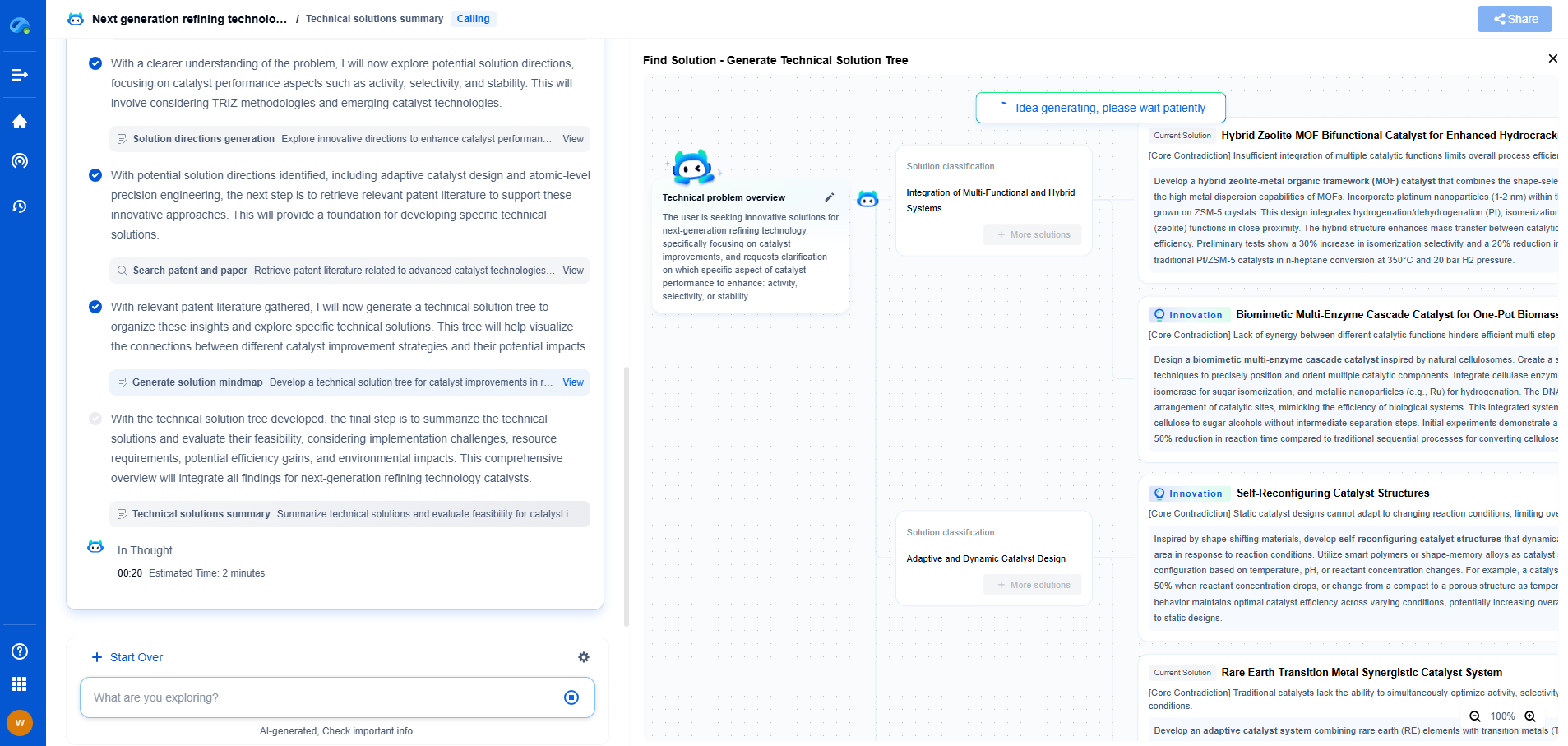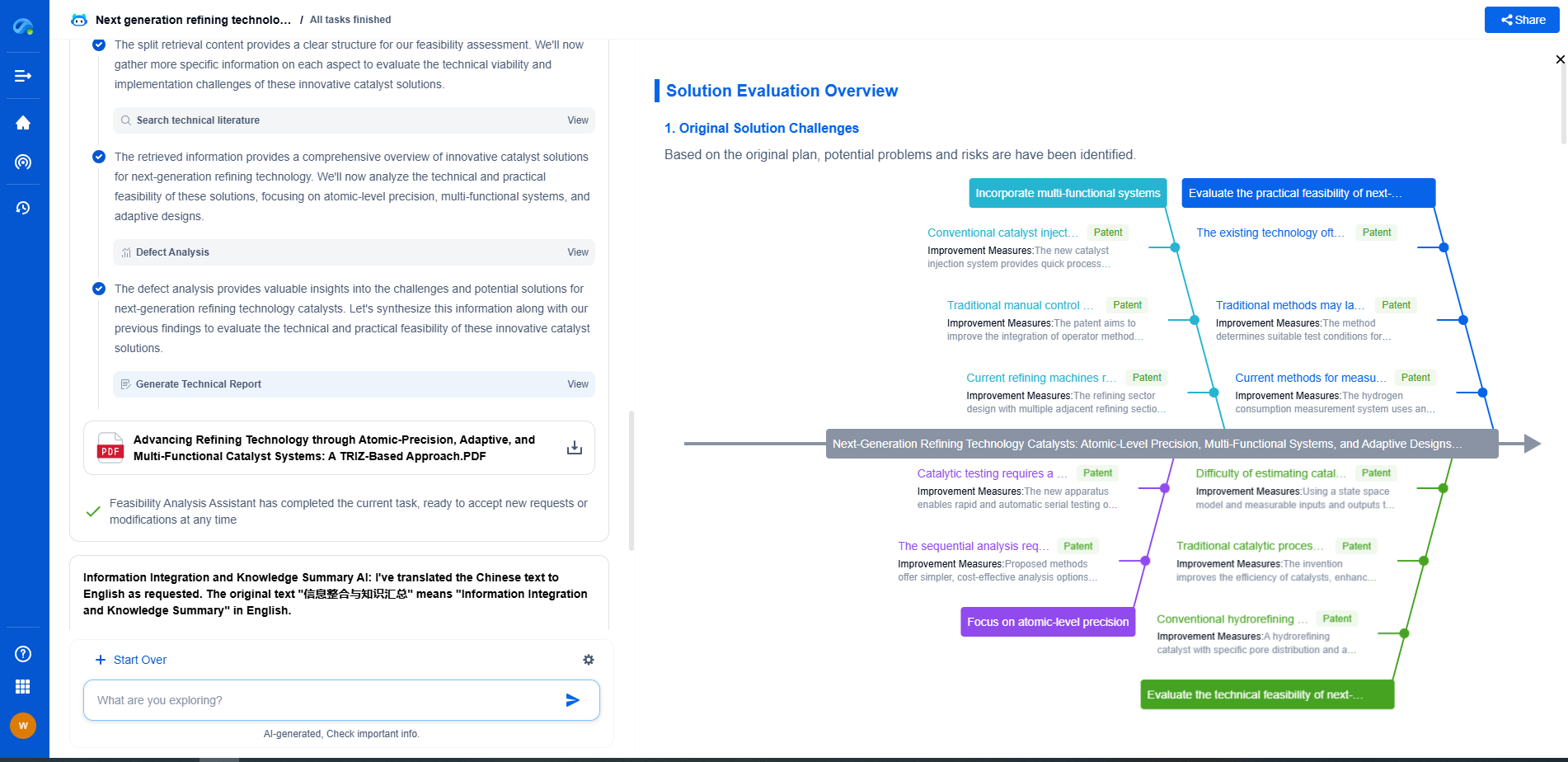What Certifications Are Required for Wind Turbine Material Suppliers?
JUN 26, 2025 |
As the world continues to shift towards renewable energy, wind power stands out as a leading solution for sustainable electricity generation. The wind energy sector relies heavily on the quality of materials used in constructing and maintaining wind turbines. These materials must meet rigorous standards to ensure both safety and performance. Therefore, certifications for wind turbine material suppliers are crucial to confirm compliance with industry standards and regulations.
Material Certification: Ensuring Quality and Safety
One of the primary certifications required for wind turbine material suppliers is material certification. This certification verifies that the materials supplied meet the necessary quality and safety standards. It involves thorough testing and documentation to ensure that materials can withstand the challenging conditions they will face, such as extreme weather, mechanical stress, and corrosion. Material certification often adheres to international standards such as ISO 9001 for quality management systems and ISO 14001 for environmental management systems.
Industry-Specific Certifications: Catering to Specialized Needs
In addition to general material certifications, suppliers must also obtain industry-specific certifications tailored to the wind energy sector. These certifications are designed to address specific needs and challenges associated with wind turbine materials. For example, the GL Renewables Certification (GL RC) and the IEC 61400 series are well-known standards in the industry that focus specifically on wind turbine design and materials.
Environmental and Sustainability Certifications
Given the renewable focus of wind energy, environmental and sustainability certifications are particularly important for material suppliers. Certifications such as the ISO 14001, which focuses on effective environmental management systems, and the ISO 50001, which emphasizes energy management, are becoming increasingly essential. These certifications not only demonstrate a supplier’s commitment to sustainability but also help in minimizing the environmental impact of their operations.
Compliance with National and International Regulations
Wind turbine material suppliers must also ensure compliance with both national and international regulations. This involves understanding and adhering to the legal requirements of the countries where their materials will be used. In many cases, this means obtaining certifications that demonstrate compliance with regulations such as the European Union’s CE marking, which indicates conformity with health, safety, and environmental protection standards.
Quality Assurance and Control Certifications
Quality assurance and control play a critical role in the wind energy sector. Suppliers need to implement robust quality management systems to maintain high standards consistently. Certifications like the ISO 9001 focus on quality management and ensure that suppliers have the processes in place to deliver materials that meet customer and regulatory requirements. Additionally, the use of advanced quality control techniques and regular audits can help identify and mitigate potential issues before they affect the final product.
The Role of Third-Party Certification Bodies
Third-party certification bodies play a crucial role in the certification process. These independent organizations evaluate and certify that suppliers meet the relevant standards and regulations, providing an unbiased assessment of the supplier’s capabilities. Engaging with reputable third-party certification bodies can enhance a supplier's credibility and reassure customers of their reliability and commitment to quality.
Conclusion: The Necessity of Certifications for Wind Turbine Material Suppliers
In the rapidly evolving wind energy sector, certifications for material suppliers are not just a formality—they are a necessity. These certifications ensure that the materials used in wind turbines are safe, reliable, and environmentally friendly. By adhering to industry standards and obtaining the necessary certifications, suppliers can support the growth of wind energy and contribute to a more sustainable future. As the sector continues to expand, staying up-to-date with the latest certification requirements will remain a critical priority for wind turbine material suppliers.
Empower Your Wind Power Innovation with AI
In the fast-evolving landscape of wind turbine technology—where aerodynamic optimization, generator efficiency, and structural innovation are critical—staying ahead requires more than just expertise. It requires intelligent tools that accelerate R&D and protect your competitive edge.
Patsnap Eureka is your AI-powered research assistant, designed specifically for innovators like you working at the forefront of Wind Motors. Whether you're analyzing blade design trends, exploring novel gearbox architectures, or navigating complex global patent landscapes, Eureka streamlines the entire process with precision and speed.
👉 Experience how Patsnap Eureka can revolutionize your R&D and IP strategy. Request a demo today and power up your next breakthrough.
- R&D
- Intellectual Property
- Life Sciences
- Materials
- Tech Scout
- Unparalleled Data Quality
- Higher Quality Content
- 60% Fewer Hallucinations
Browse by: Latest US Patents, China's latest patents, Technical Efficacy Thesaurus, Application Domain, Technology Topic, Popular Technical Reports.
© 2025 PatSnap. All rights reserved.Legal|Privacy policy|Modern Slavery Act Transparency Statement|Sitemap|About US| Contact US: help@patsnap.com

